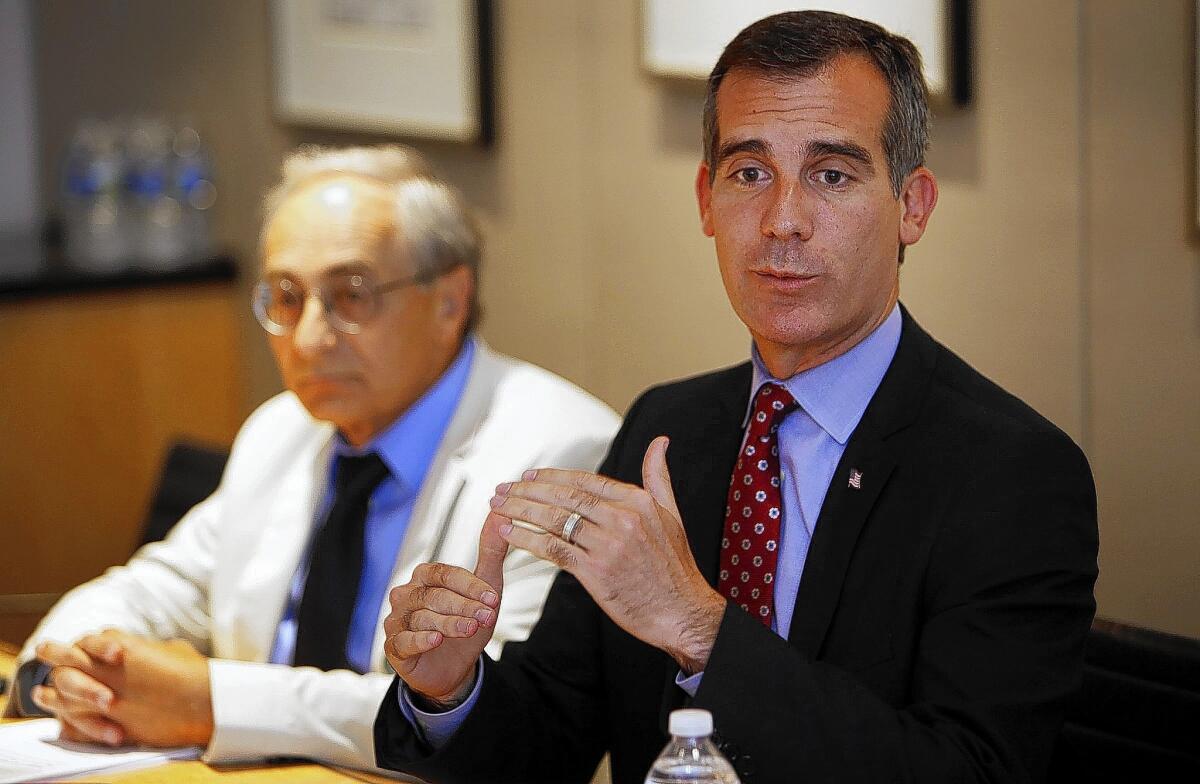Mayor Garcetti says L.A. discussing ballot measure on business tax

- Share via
Los Angeles Mayor Eric Garcetti said Thursday he and other elected officials were exploring the possibility of a ballot measure that would eliminate the city’s tax on business receipts and replace it with a different tax on companies.
Garcetti, who has been pitching a plan for raising the minimum wage to $13.25 per hour by 2017, said talks have been taking place at City Hall about a tax proposal that could reach the voters as soon as March.
Eliminating the gross receipts tax outright would devastate the city’s budget, depriving it of about $450 million annually. Garcetti said officials were considering a replacement tax that would ensure that the city could continue providing services. He would not say how much smaller a replacement tax would be, but suggested that it could be based on other criteria, such the number of employees working for a company, or the square footage of its facilities.
“I don’t think anybody has said business shouldn’t pay anything,” he said.
The tax has long been a source of exasperation for business leaders, who say it puts L.A. at a competitive disadvantage. Council President Herb Wesson and Councilman Paul Krekorian have spent months crafting a business tax ballot measure and will unveil it within a few weeks, said Ian Thompson, Krekorian’s spokesman.
Thompson said it was too soon to say whether the measure would rework the existing tax or provide a replacement. The ballot measure, he said, will “dramatically simplify the city’s current business tax and make L.A. far more competitive and fair for businesses.”
The mayor mentioned the tax measure concept while meeting with the Times Editorial Board, where he sought to drum up support for his minimum wage proposal. Business leaders have criticized that idea, saying that it would cause some workers to lose their jobs and others to experience a reduction in work hours.
Garcetti said a measure to rework the tax structure could deliver a boost for businesses worried about the minimum wage proposal. But Carol Schatz, president of the Central City Assn., said she was troubled by the idea of business taxes becoming the subject of a political campaign.
“As much as we favor an elimination of the gross receipts tax, we don’t think the decision about what tax should replace it, if any, should be on a ballot,” she said. “Those are complicated economic issues that need to be fully vetted, and I’m not sure that happens in an election with 30-second [advertising] spots.”
Garcetti promised that he would eliminate the tax during last year’s election campaign. The council voted in May to draft an ordinance that would reduce the tax by $15 million per year over a three-year period ending in 2018. That plan, which would go into effect in January 2016, still would require a council vote.
A ballot measure reworking the city’s business taxes could render that previous plan moot.
Lloyd Greif, chairman of the city’s Business Tax Advisory Committee, said an assessment based on square footage or the number of employees would be preferable to the current tax. With nine business classifications and six rate categories, the existing business tax is “byzantine” and “subject to a lot of manipulation,” he said.
Greif said a ballot measure to replace the gross receipts tax also would be preferable to the three-year reduction that was part of Garcetti’s recent budget. That initiative would provide only a 10% reduction in the gross receipts tax.
“What was included in the mayor’s budget doesn’t get it done,” he said. “It doesn’t move the needle.”
david.zahniser@latimes.com
Twitter: @DavidZahniser
More to Read
Sign up for Essential California
The most important California stories and recommendations in your inbox every morning.
You may occasionally receive promotional content from the Los Angeles Times.














